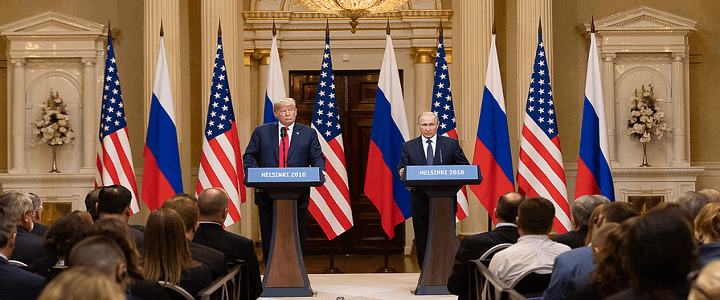Has the whole “Trump-Russia” thing been a set-up from the start? It’s a charge so outlandish that had it come from other sources, I would be hard-pressed to believe it. It’s a charge so politically radioactive that you won’t hear about it it too many other places. But you should.
Freelance national security reporter Sara Carter (with whom I have worked in the past and believe to be an upstanding, professional journalist), published a bombshell of a report Monday regarding retaliation against a government employee for blowing the whistle internally – the way you’re supposed to do it. The problem is that he blew the whistle on sweetheart contracts given to Stefan Halper, a university professor and former Republican adviser who has close ties to the Russian government.
Reporting on Halper and the government employee in question, Adam Lovinger, is not new. Both were in the news in May when Halper’s name first surfaced as the potential FBI source inside the Trump campaign. But Carter has gone deeper into Halper’s work than others, reaching the conclusion that he was the FBI’s source and that he used his Russian connections to set-up Trump campaign aides Carter Page and George Papadopoulos.
the government retaliates against a whistleblower
Lovinger worked as an analyst in the Office of Net Assessment (ONA) in the Office of the Secretary of Defense, often called the Pentagon’s internal think tank. From outward appearances, Lovinger did an exemplary job, earning a secondment to the National Security Council (NSC) as a senior director for strategy. But according to Carter’s report, within five months, “he was recalled to the Pentagon, stripped of his prestigious White House detail, and ordered to perform bureaucratic make-work in a Pentagon annex.”
In March of this year, the DOD revoked Lovinger’s Top Secret clearance. In April, Washington Headquarters Services, which runs the administrative aspects of the Pentagon, placed Lovinger on administrative leave, according to his attorney, Sean Bigley.
Bigley, who specializes in security clearance cases, is a frequent contributor to ClearanceJobs.
While performing his duties in ONA, Lovinger noticed at least a million dollars flowing to Stefan Halper, then professor emeritus at Cambridge who had served as a foreign policy adviser to George H.W. Bush and Ronald Reagan in the 1980 campaign season. That in itself wasn’t unusual, but Halper also appeared to be conducting his own foreign policy negotiations on behalf of the Pentagon. We can argue the merits of the constitutional cases for and against the Logan Act, the law that makes it a crime for a private citizen to conduct independent diplomacy. But one thing is clear: conducting foreign policy negotiations on behalf of the U.S. government is an inherently governmental function. If Halper were indeed paid to conduct these negotiations, it would be a serious government contracting no-no.
Stefan Halper is the alleged spy inside the trump campaign
Halper is alleged to be the “spy” the FBI had inside the Trump campaign in 2016. According to Carter, he completely set-up Page and Papadopoulos to preserve the establishment’s hold on power. His name surfaced in numerous media outlets in May as the FBI’s informant inside the Trump campaign. Since Halper is Republican, many pooh-poohed this revelation, arguing that his background made him an unlikely candidate for someone to rat on Trump.
But according to one anonymous intelligence official who spoke to Carter, “The FBI [used] Halper to get more information on Trump aides but it’s Halper who has the real connection to Russia.”
Carter’s reporting reveals that Halper “appears to also have significant ties to the Russian government, as well as sources connected directly to President Vladimir Putin.” His academic work put him in frequent contact with Russian officials, and he often invited Russian intelligence officers to participate in seminars and conferences. And Halper was the one who invited Flynn to a 2014 dinner where Halper introduced the Defense Intelligence Agency commander to Svetlana Lokhova, a Russian academic whose name would later surface in the FBI’s “Crossfire Hurricane” investigation.
what is the government trying to hide?
So here we have a man who is well connected to the Russian government, including its intelligence services, acting as the FBI’s source of information into the activities of two low-level aides to the campaign, and also allegedly inflating the importance and substance of Mike Flynn’s conversations with a Russian academic.
And yet the person who raised questions over Halper’s activities on behalf of the government was punished. I need to stress that unlike publicity-seeking “whistleblowers” who leak classified information to the press, Lovinger did it the right way, alerting his chain of command inside the Pentagon that something wasn’t right with the Halper contracts. But despite any evidence of wrongdoing, Lovinger lost first his NSC post, then his security clearance, and likely his job altogether.
Judicial Watch, a conservative watchdog group who has been very successful at convincing the courts to force the government to release information it was trying to keep hidden, is suing to obtain the documents detailing Lovinger’s punishment at the Pentagon.
The whole thing stinks
I am not alone in saying that it is possible for two things to be true simultaneously: that the Russian government was responsible for “meddling” in the 2016 presidential election, and that the Trump campaign, while benefiting from it, had nothing to do with it.
The government needs to come clean, both about the nature of Halper’s work for the Office of Net Assessment, and its apparent retaliation against Lovinger for asking the right questions.




